[ad_1]
A week into Balatro – Balatro were jesters and fools in ancient Rome; I googled it – I’d say that this is the Goldberg Variations of Poker. It’s Poker: Possibility Space Edition. It’s a roguelike deckbuilder that starts with the basic poker hands and then allows you to level up the winnings of those hands, add new cards to the deck and alter existing ones, and bring in a range of jokers that modify the game rules in bizarre ways. And yet, it’s still poker underneath it all. (Actually, the solo dev says it’s Big Two, and I will take their word for it.) So, like the Goldbergs, it’s expansive, ingenious, eager to turn every closet over and every pocket inside out. But also, like the Goldbergs, its invention is a thing of precision, of sounding out specific possibilities. So it feels really, really big – bottomlessly big – and also extremely compact: localised, particular.
Over the last few weeks it has taken over the gaming world completely, and I can see why. A poker roguelike is such a brilliant idea you almost don’t need to make it to see how clever it is. There are a few of these, and Balatro is comfortably the best I’ve played. It really is ingenious – and it’s also ingeniously simple. Let us get into this.
It’s poker. Honestly it is. And for the first rounds of a new run, before you’ve started to flare things in weird directions, you’ll be playing pretty straight poker. You are dealt cards. You make poker hands. A flush? Nice. A straight? Absolutely fine. When it comes to real poker in the real world, I am the earnest, plodding friend of two pair. Two pair is it for me: nice try, not going to blow people’s minds, you did your best.
 Balatro | Launch Trailer- THE Poker Roguelike | Xbox Series X|S & Xbox One
Balatro | Launch Trailer- THE Poker Roguelike | Xbox Series X|S & Xbox One
But then you win a round or two, by matching or exceeding the blind – each card has a chip value and your hands also boost the multiplier; low blinds start at around 300 chips and are not hard to reach. And then you get a shop between rounds. This is where Balatro lives. The shop is its big thing. And here’s why.
In the shop you spend your winnings so far to buy things that allow you to take on bigger blinds. At the simplest level, these might be planet cards that level up the multipliers and chip values of hands. So, level up my favourite two pair a few times and suddenly a two pair is a big deal – a better bet than three-of-a-kind if you haven’t leveled that one up yet. Just stick with planet cards and by the end of a run almost every hand you play will have a little extra oomph behind it. Not bad at all.
But there is more, of course. Tarot cards allow you to add new elements to the cards you have in your deck, so an ace might come with a killer multiplier of its own, or might give you extra chips if you keep it in your hand and don’t play it. Stuff to keep in mind!
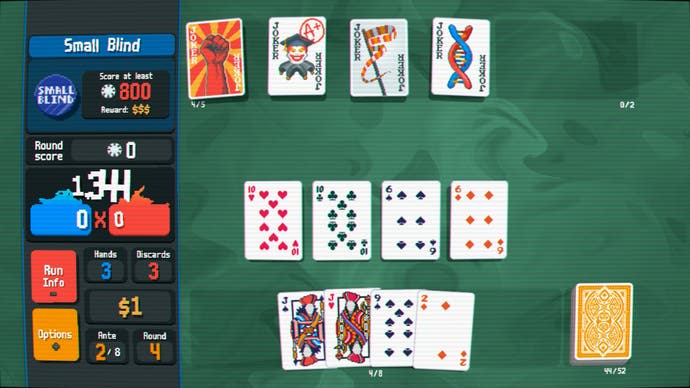
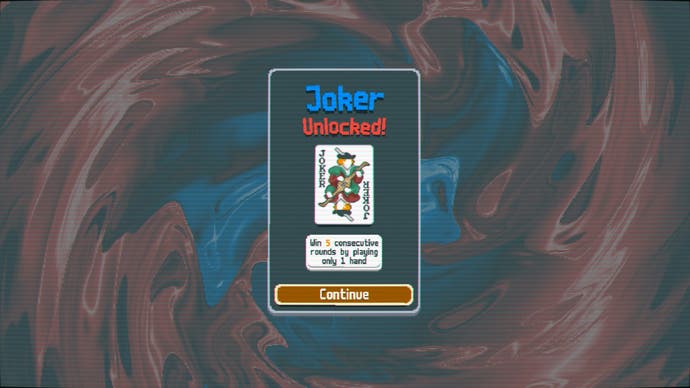
Then there are jokers. Jokers create new rules. They stick with you for the course of a run unless you sell them back to the shop, and generally you can have five in play at any one time. A standard joker might add a nice multiplier, or give you a multiplier when a hand contains a certain card. A slightly weird joker might give you a bigger hand to choose from, or might give you a massive multiplier if you burn through all your discards. That one is a good example of the form, actually: jokers here don’t just reward you, they often encourage you to take stupid risks. They channel the part of the poker spirit which keeps you hanging onto an ace that is messing up your modest hand just because to give it up would be to give up on a dream of splendour.
And that’s just the slightly weird jokers. For my first dozen hours, I thought jokers were the absolute apex of Balatro. I thought they were it. I went online and saw loads of wild builds, but there’s also that glorious RNG to it, to seeing which of them turn up in the shop and making something out of that. But then I got wise. Friends, I love the planet cards, I kind of love the Tarots, and I definitely love the jokers. But what I’m all about now is the basic card booster packs you can buy in the shop. Because these are where the real long-term marathon fun of a Balatro run kicks in.
These booster packs will often have a spiffy card with a neat twist to pick from, but don’t ignore the fact that even the basic cards send you into battle with duplicates. You might suddenly have a deck of cards with 53, 56, 60 cards in it! You might have seven sevens, a dozen queens. Last night, and it is almost scandalous to type this, I swear that jokers and Tarots and card packs together had given me a deck that was overwhelmingly nines and jacks. The hands you can make with that. The likelihood that you’ll get something great!
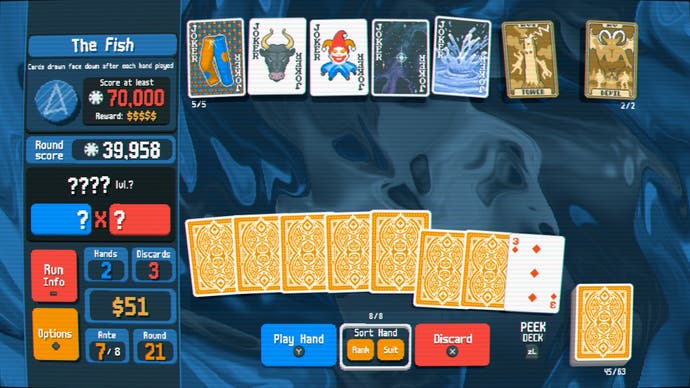
Somehow, we are still in the shop. In truth that’s where I spend a lot of this game, picking between options, imagining the different strains of run I will get. Skimming over the Goldberg Variations – a fast one, a slow one? Glenn Gould or that new guy? Which Glenn Gould? (I appreciate here that if you’re not a fan of the Goldbergs, this review is even more of a wash-out than usual. What I would say to that is: sorry, and also give them a listen! To quote the maze designer Greg Bright, Bach “made the law sound like freedom”.) Happily, when you get out of the shop, the game is there to match your growing power. The blinds go up, but also boss blinds bring in their own wrinkles. Early on, a suit may be debuffed. Later on, you may only be dealt new cards face-down, and you have to make the best of them.
This is where the game is at its best for me, actually. I’m an hour in, I’m all nines and jacks just the way I like it, but here’s a huge blind and all my cards are coming out the wrong way. We’re in the garage, the MOT is due, and one of our wheels is on backwards and the other three are made of licorice. I like these moments because they counter my nagging worry that everything in Balatro is just dressing and mounting for the fact that it’s multiplication tables. You flare this and you switch that in and turn on these odd rules and amp your deck, but you’re still waiting for the multipliers to ping upwards and for your score to catch fire the same as always.
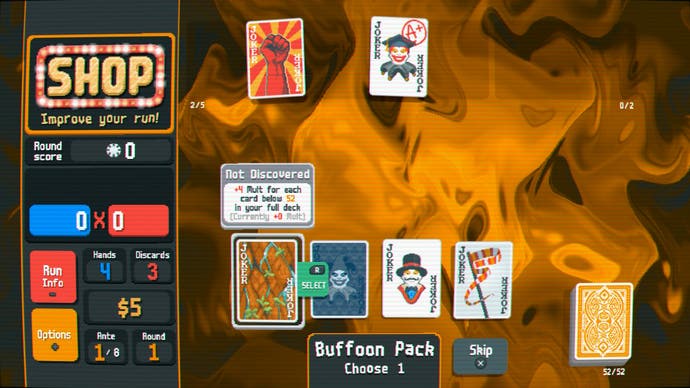
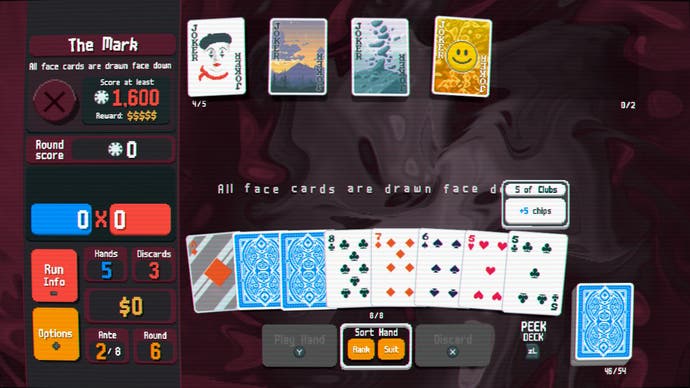
I like Balatro an awful lot. At first, I’ll admit, I was slow to get it, as I am bad at poker and it took me a while to realise that this was a machine for getting revenge on poker as much as it is anything. I watch high level players on Twitch and I see that Balatro is capable of genuine cascading beauty – an expert will plug in the jokers, invest in the right planets and Tarots and rig the deck and they’re not just dealing with something specific, they’re aiming for something, also specific, a super-build or double-twist, and it will be like information pouring out of a White Hole and pooling in the radioactive space around us. I think some people are going to stick with this game and never move on. But I also suspect I will move on in a few weeks, and I’m trying to work out why I think that, despite all the fun I’ve had, despite the game’s effortless compulsion and its obvious class.
Firstly, I don’t have the necessary gifts. Just as I don’t intend to make poker my life because I can barely count to 10, I don’t fully feel at home in a world of maths and cause-and-effect even when all the counting is done for me. Secondly Balatro’s almost too ingenious and too neat for me. It all works and it clips together so beautifully that I sometimes find it slightly airless. It’s staggering to me that this is the work of a single person, but for me it lacks that spark of strangeness, of design risk, that keeps me returning to a deckbuilder like Cobalt Core. The neatness and focus is what makes Balatro a wonder – I think it is still neat even when you’re breaking everything – but I think it’s also why a certain kind of player will eventually look for something else.
That’s a downbeat ending for a review of something so striking and so brilliantly constructed, and something that has given me such pleasure for the last week. But in a way, I even find this to be part of Balatro’s generosity. It’s the realisation that something can be fundamentally beautiful, but also not quite for you. And that is fine. Anyway. I hope Balatro’s for you, and I hope you have a brilliant time with it.
[ad_2]
Source link



